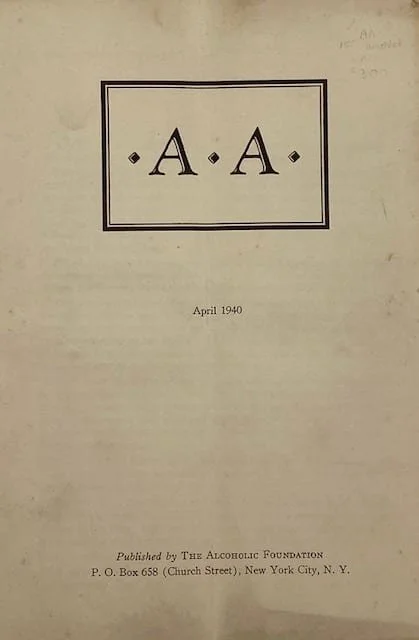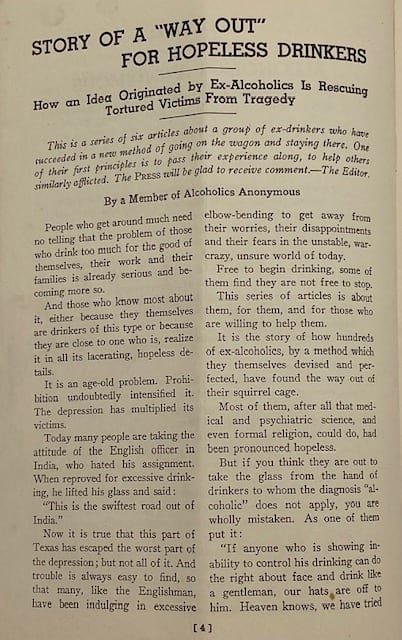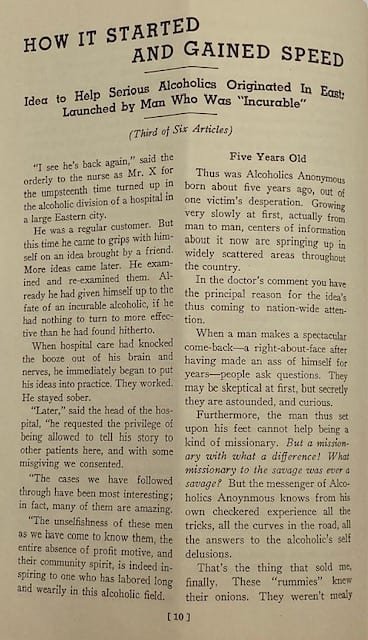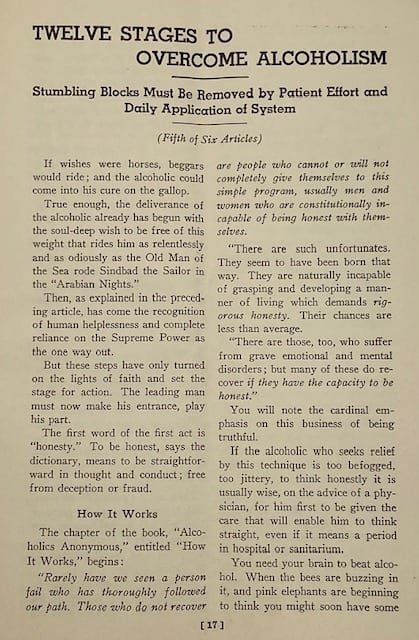The First A.A. Pamphlet
Alcoholics Anonymous literature has greatly served and assisted millions of alcoholics to understand the nature of the disease, and as well to recover from it, one day at a time. Here is the text — along with referential images — of the first A.A. pamphlet, with its own history recounted forthwith. [Text pulled from the Silkworth.net website, so named after Dr. William Silkworth, author of The Doctor’s Opinion chapter of the A.A. Big Book.]
“THE FIRST ‘A.A.’ PAMPHLET
As Derived from The Series of Six Articles from “The Houston Press”
by Larry J.* -April 1940
*Larry J. came to Houston from Cleveland with only a Big Book and a Spiritual Experience resulting from having taken the Steps while hospitalized. His Sponsors were Dr. Bob & Clarence S. He had not attended an A.A. meeting before coming to Houston.
ALCOHOLICS ANONYMOUS is an informal society of ex-alcoholics who aim to help fellow problem drinkers recover their health.
Rapidly growing, now numbering about 8000, our Fellowship is spreading throughout the country. The first member recovered seven years ago. Strong chapters, over one hundred alcoholic men and women each, are to be found in Cleveland, Ohio–Akron, Ohio–New York City. Vigorous beginnings have been made in Los Angeles. Baltimore, Milwaukee, Kansas City, Chicago, Detroit, Philadelphia, Washington D. C., St. Louis, and Houston, Texas.
“This approach to alcoholism is squarely based on our own drinking experience.... We think each man’s religious views, if he has any, are his own affair. No member is obliged to conform to anything whatever except to admit that he has the alcoholic illness and that he honestly wishes to be rid of it.
”
We of A.A. believe that two-thirds of our number have already laid the foundation for permanent recovery. More than half of us have had no relapse at all despite the fact we have often been pronounced incurable.
This approach to alcoholism is squarely based on our own drinking experience, what we have learned from medicine and psychiatry, and upon certain spiritual principles common to all creeds. We think each man’s religious views, if he has any, are his own affair. No member is obliged to conform to anything whatever except to admit that he has the alcoholic illness and that he honestly wishes to be rid of it.
While every shade of opinion is expressed among us we take no position as a group, upon controversial questions. We are only trying to aid the sick men and distracted families who want to be at peace. We have found that genuine tolerance of others, coupled with a friendly desire to be of service is most essential to our recovery. There are no dues or fees; our alcoholic work is an avocation.
The Alcoholic Foundation of New York is our national headquarters. Your inquiries will be answered if addressed to Post Office Box 658, Church Street Annex, New York City.
The Fellowship publishes a book called “Alcoholics Anonymous” setting forth our experience and methods at length. An excellent review of the volume by Dr. Harry Emerson Fosdick appears on page 27 of this booklet. Directions for obtaining the book and a detailed description of the Alcoholic Foundation will also be found there.
On page 32 physicians will find an excellent medical paper describing our approach. This paper appeared last year in The Journal Lancet (Minneapolis) and was written by Dr. W. D. Silkworth, Chief Physician at the Charles B. Towns Hospital, New York, where our work had its inception five years ago.
We can no better present the spirit and purpose of Alcoholics Anonymous than to invite a reading of six articles that recently appeared in The Houston Press. These pieces were written by one of our newer members, a newspaperman who, scarcely two years ago, found himself in that shadowy No Man’s Land which lies just between Here and Here-after. Due to grave alcoholism and pulmonary trouble, two institutions had refused to admit him–too nearly dead, they thought. Then he found the Cleveland A.A. Fellowship. Now he’s on a Texas newspaper!
Let Mr. Anonymous of Houston and his editor tell you about it—-
AN EDITORIAL (As published by the Houston Press)
ALCOHOLICS ANONYMOUS
Age-old, but still alive, is the question as to when the drinking of alcoholic beverages ceases to be a social lubricant, an aid to conviviality, a solace to the weary and distressed, a tonic to the body and spirit; and when it becomes a devourer of health, success and happiness.
People of independent spirit like to settle the question for themselves.
People inclined to reform their neighbors–and even many otherwise reticent people, because they are honestly and generously concerned over the welfare at least of those near to them–sometimes come to the front with suggestions for the control of drinking, or even for its abolition.
But neither of these attitudes is the concern of Alcoholics Anonymous, a group of several hundred ex-drinkers who have taken to the wagon by a technique of their own, and who are riding there today after most of them had been pronounced hopeless by friends, families, employers, physicians, ministers, psychiatrists, hospitals and sanitariums.
They call themselves true alcoholics–people in whom alcohol becomes a disease for which medical and psychiatric science has not yet found a specific cure.
They say their cure works. They show as witness hundreds of lives restored to health and usefulness, hundreds more among their families relieved of terror and despair, and restored to happiness through the alcoholics’ changed lives.
The Press thinks their problem and their unusual success with it is so important that it begins today a series of six articles on Alcoholics Anonymous, written by “One of Them,” now living in Houston.
The series should provoke thought among the friends and families of “alcoholics,” among physicians and psychiatrists, ministers, social workers, employers, men’s and women’s clubs–and alcoholics.
The Press takes a liberal attitude on drinking. It stood for the repeal of prohibition. But even the liquor industry, we believe, would wish success to a technique that promises much to the men and women who cannot handle their drinks.
Inquiry and comments are invited.”












